Source: Beloved John
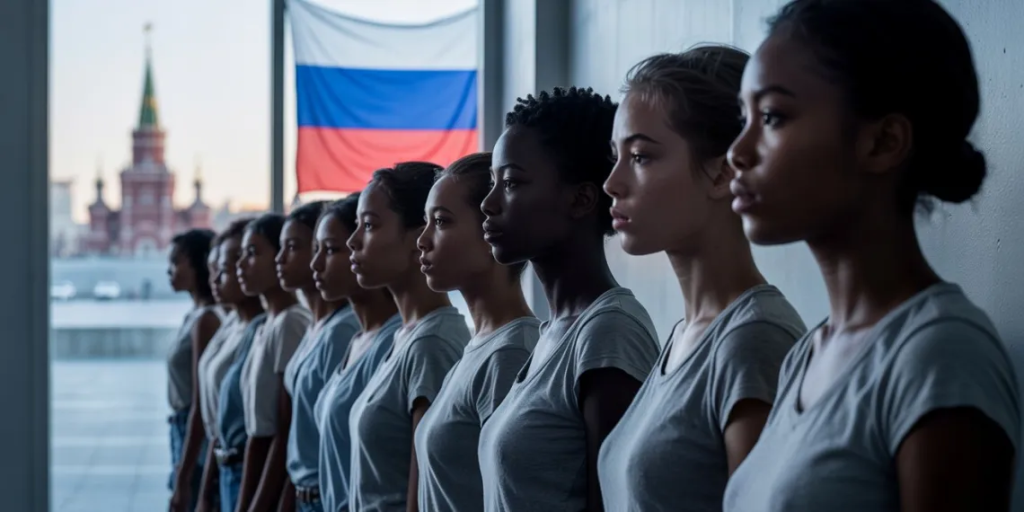
Young Nigerian women in line in Russia [PHOTO CREDIT: Ideogram]
Late last year, the world was alerted to the disturbing news that Russia was recruiting hundreds of young African women, aged 18–22, to manufacture drones in a military-industrial compound 1,000 km east of Moscow called Alabuga. The reports also said that the recruits—from at least 15 African countries—were promised good salaries and skills training, but that, once there, they were often trapped, facing tax deductions, dangerous working conditions, strict surveillance, and difficulties in returning home.
In the past six months, a ZAM team in seven African countries, including PREMIUM TIMES in Nigeria, investigated the Russian recruitment exercise—and why so many young Africans grab the chance to go, sometimes even after being warned. In Nigeria, Beloved John of PREMIUM TIMES joined a long queue of women trying to apply.
The Alabuga Start Programme says on its Telegram page that only young women between the ages of 18 and 22 can apply because “this is considered an ideal age range to begin building a career from scratch.” This may be so. But after going through the first part of the recruitment process myself, I have come to think that there may be another reason.
Maybe they just target impressionable youth? Maybe more mature adults would not put up with the badly written emails and long silences we get from our Human Resources (HR) recruiters? Or is our -perhaps youthful- desire to ‘japa’, leave Nigeria, so strong that we will put up with anything at all?
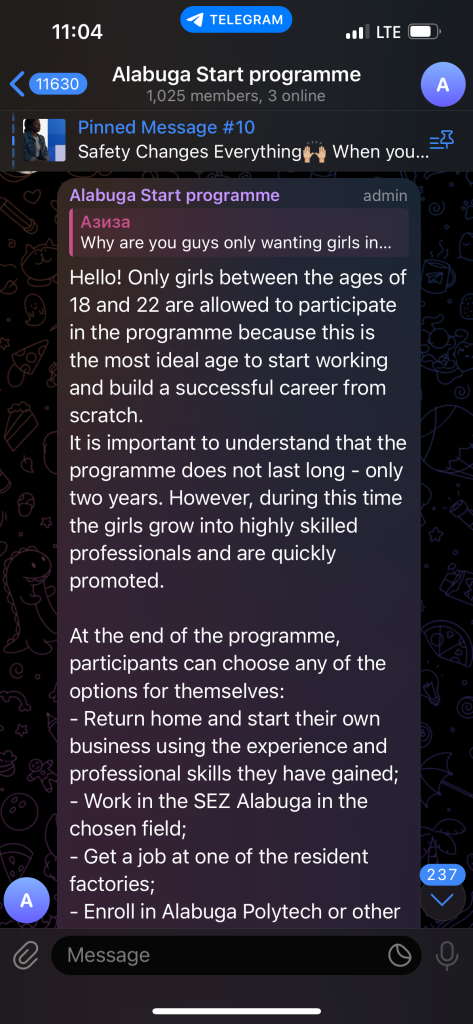
The Alabuga Start Telegram group page.
When I register, I first find that there is no application window. The process lasts all year round; it has no cycle or deadlines. From messages by other applicants on the Telegram channel, I gather after a while that the process typically spans a minimum of three to four months, but can last up to a year. This is probably partly related to the fact that we are quite a queue here: over one thousand group members, from all over Africa.
My fellow applicants complain about a lack of communication, half-answered and repeated emails, or a deep hole of silence after what appears to be some progress. “(Three months) is if you are lucky. It depends on how fast and responsive your HR specialist is,” Priscilla Eze* (20), one of my co-applicants, tells me.
Russia probably doesn’t have enough ‘HR specialists’ to engage with all of us at once. There must be pre-selection criteria in place; however, we are not told what they are. The Alabuga scholarship, advertised on Nigeria’s Ministry of Education’s website, had only asked for a high school certificate and an 18-22 age range. It has looked very appealing, with polished-sounding descriptions of salary, duration, structure, and skills training options. But going through the process, some of us start to doubt if all is what it seems.
I start questioning Alabuga’s registration professionalism after I complete my short bio form on the Alabuga Start official website with name, age, and contact details.
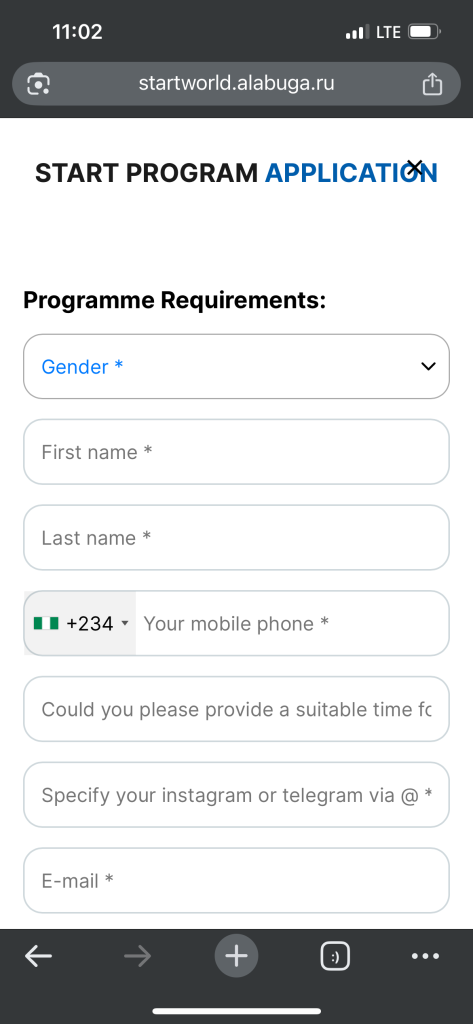
A picture of the short bio form on Alabuga’s website.
From there, I have been directed to the Telegram group page, where I have found my co-applicants trying to enrol. To find that, unlike in most professional application processes, all interaction with Alabuga is primarily conducted on Telegram was the first raised eyebrow for me.
I must be making a good impression, though, because it’s not long before I am assigned an “HR specialist,” who says their name is Halilov Nurlan. But Nurlan’s communication is also not very professional. Their first message, sent simultaneously to my email, Telegram, and WhatsApp accounts, does not include a subject line and contains both grammatical errors and random emojis like a wave, a lightbulb and a heart.
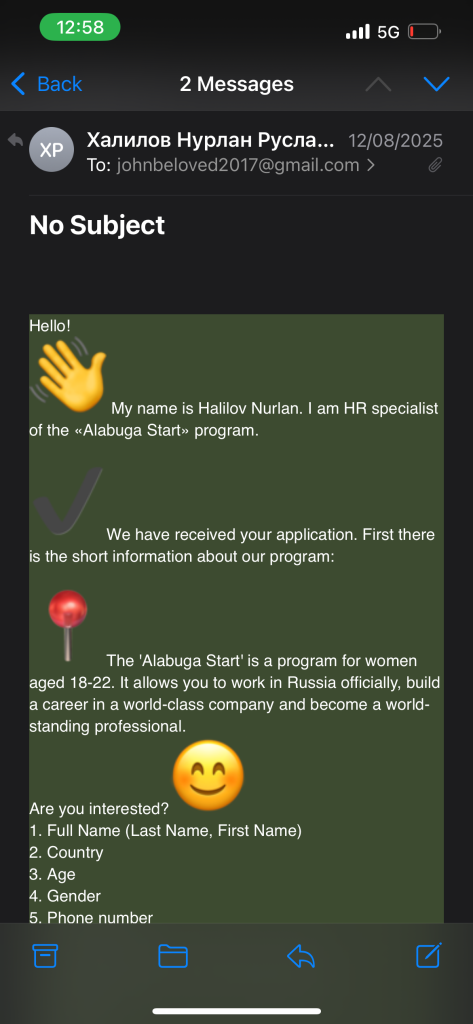
A screenshot of the email received from Alabuga “HR Specialist”.
Later in the process, interacting not only with Nurlan but also with other “human resource specialists”, I am asked to submit a video essay which details my “work experience,” even though the scholarship is advertised as available to students at the high school level. They then also want me to scan and submit every single page of my passport. Asked about this, Nurlan responds that this is for processing “a visa and a migration card, like it is done for all foreign residents who come to Russia.” Thereafter, I am told, I must still submit a medical examination result that proves I don’t have a ‘chronic condition’, do a simulation test and learn 100 Russian words.
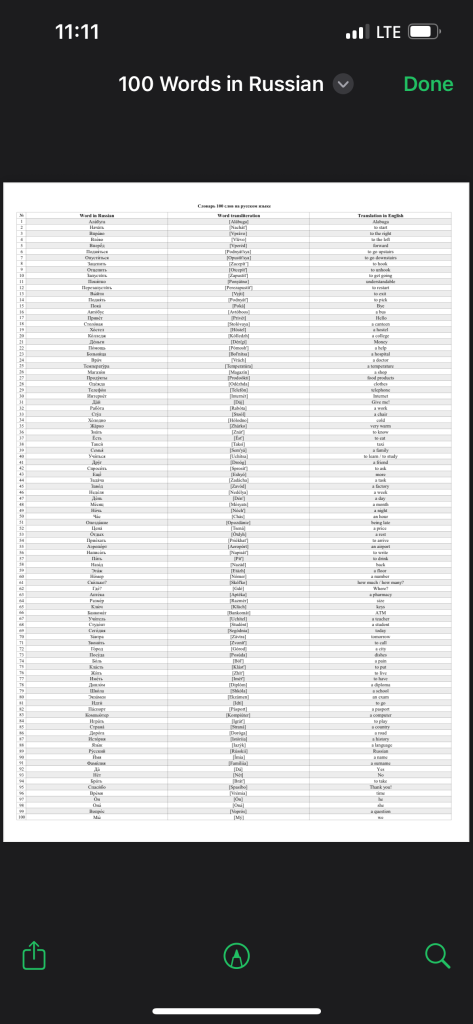
The 100 Russian words applicants are to learn.
It all becomes a bridge too far for me, and I jump ship. Fellow applicants who stay on board tell me later that they were informed by their “HR specialists” that their data had been processed and sent, first to the Russian Ministry of Foreign Affairs and then to the Russian embassy in Nigeria. One of them, Elizabeth Ojewale*, tells me that, at the end, “they will send your document to the Ministry of Foreign Affairs to issue you an invitation to come to Russia.” Another, Grace Onochie*, adds that “you will book an appointment with the embassy in Abuja (Nigeria) for your visa. Then Alabuga will book your flight, and then you go.”
Most applicants I have been talking to have persisted throughout the dodgy process, even after having seen warnings about Alabuga. Only Fatimah Yusuf* tells me she has begun to reconsider her decision to enrol in Alabuga Start after noticing that an inquiry about the programme was quietly deleted from the Telegram group page. The deleted post, shared by an unknown user on 17 August, was a screenshot of ChatGPT’s response to a “concern about Alabuga start” prompt. The first sentence in the images reads, “deceptive recruitment,” and another reads, “exploitation and poor working conditions.” The user shared the screenshot with the caption, “Tell me.”
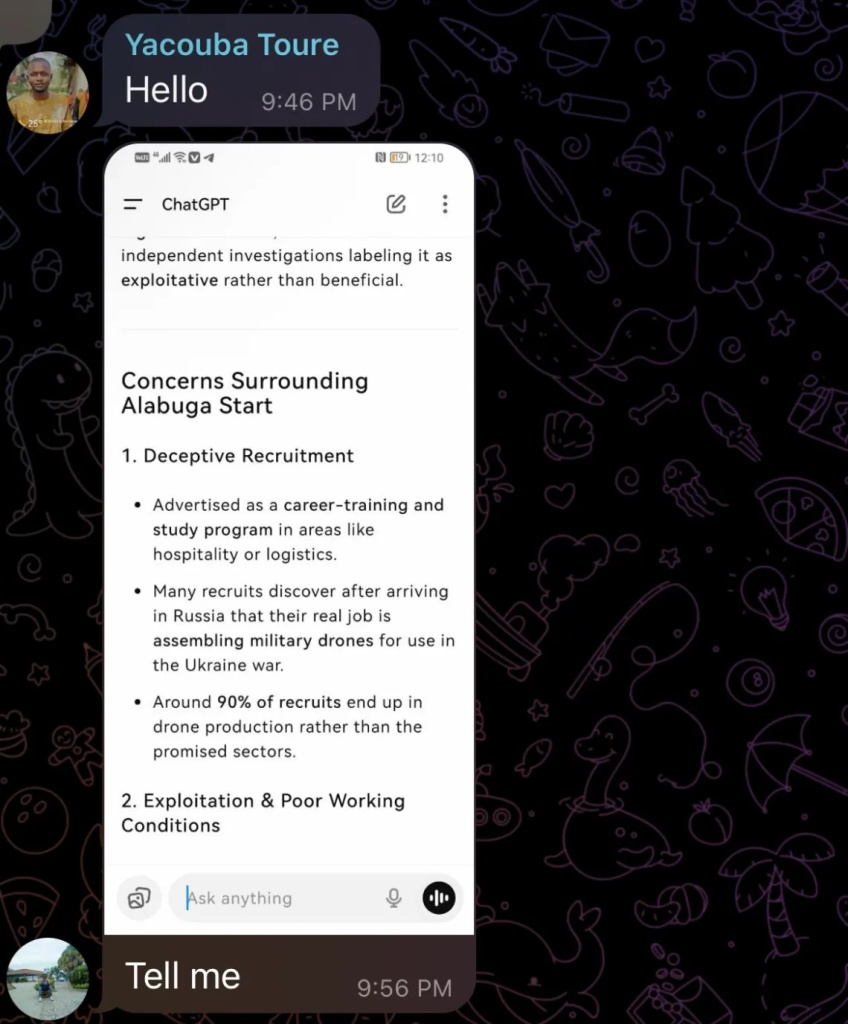
The message sent to the Telegram group page by an unknown user.
Ms Yusuf had been alarmed by the post, but she said she hoped a response from the Alabuga group admin would clarify the misconception. Seven hours later, she found that the message had been deleted from the group. “I don’t know anymore. I don’t think I want to continue. I am so confused. I have devoted so much of my time to this,” she said. “I just checked myself. It’s true.”
Her disappointment was palpable since for her the programme had represented the opportunity of a lifetime. Ms Yusuf had, she said, completed secondary school three years earlier but was unable to continue to university due to financial constraints; she was now sitting at home, frustrated. She had felt energised, thinking she had found a new purpose, when she had come across social media posts and videos of young women who purported to be at Alabuga, -like an Ethiopian participant portrayed in an advertorial published on both our Daily Post and Pulse Nigeria sites, who had been quoted as saying she was “happy with her career growth”; and one fellow Nigerian, Victoria Kilani, whose “testimonial” that there were “no downsides” and “no racism” at Alabuga- was published by West Africa Weekly.
That the “interviews” were not the original work by the media that carried them, but simply copied on from Alabuga PR texts, was probably unclear to Ms Yusuf and others like her. Combined with Alabuga’s animated images and motion graphics on Telegram, WhatsApp, X, and other social media platforms, which regularly featured young fictional characters from poor economic backgrounds who went on to achieve success at Alabuga, the PR posts had filled Ms Yusuf with hope. “The problem has been money,” Ms Yusuf had told me. “With Alabuga, they told me you can make money and go to a university after you finish the programme. But now I can’t do it. I cannot risk it,” she had ended, sadly.
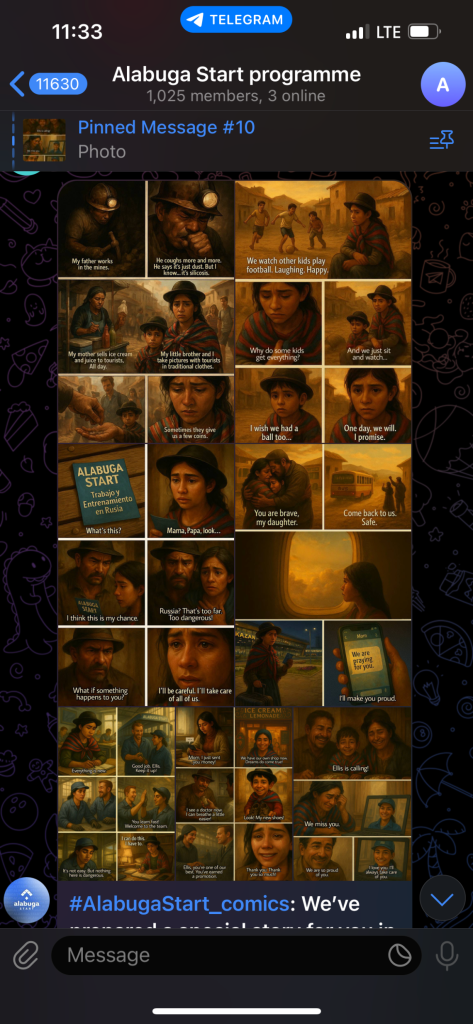
PR images shared on the Telegram group.
Unlike Ms Yusuf, however, Nneka Amadi*, from Lagos, has remained unfazed by the warnings. “I haven’t secured admission into a university. I don’t have the funds. My parents couldn’t sponsor me. A scholarship (to Alabuga) will be my only escape route.”
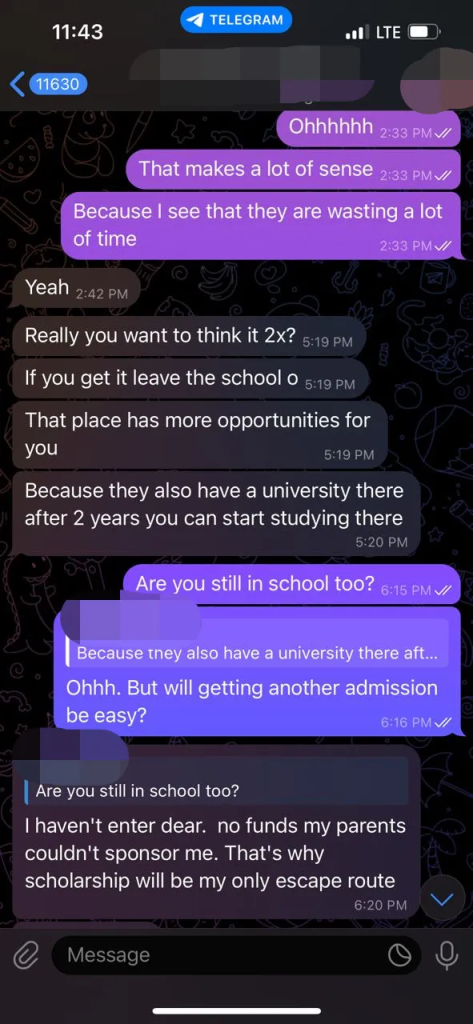
The conversation with Ms Nneka
Even if one has the funds, it is not easy to get into higher education in Nigeria. Data from the country’s Joint Admissions and Matriculation Board (JAMB) show that over one million young people seek admission each year but are denied access. Yomi Fawehinmi, an educationist, researcher, and human resources professional, says he understands very well why youth would hope for an opportunity such as seemingly offered by Alabuga. Getting into a university “is a significant challenge in Nigeria, especially when you consider the rising level of poverty,” he said.
As a result, it’s not just young people themselves who flock to the Alabuga opportunity. In the Telegram channel, but also in a dedicated WhatsApp group, I even find parents trying to enrol their daughters, siblings trying to research or ask follow-up questions on behalf of relatives, and prospective applicants seeking guidance on the admission process.
Generally, opportunities in Russia are increasingly familiar terrain for those who try to ‘japa’, as the term goes: leave Nigeria to seek greener pastures abroad. Thousands of Nigerians have already studied in Russia in recent years. The Russia-Nigeria Bilateral Education Agreement (BEA), jointly administered by the Russian Ministry of Education and its Nigerian counterpart, through the Federal Scholarship Board (FSB), is the primary driver of cooperation. Each year, the Russian government grants scholarships to about 100 Nigerian students. According to the web page of the Nigerian embassy in Russia, there are more than 2,500 Nigerian students currently enrolled in universities across Russia, particularly in cities such as Moscow, St Petersburg, Kazan, Belgorod, Rostov, Voronezh, Kursk, and Samara. However, though advertised in the web portal of Nigeria’s Ministry of Education, the Alabuga Polytech is not one of these.
Reaching out to the Ministry of Education to inquire why the Alabuga scholarship is on its website, I was directed to the Federal Scholarship Board, which, I am told, oversees such listings. A response from FSB director Ndajiwo Asta states that neither her agency nor the ministry itself has “involvement” with the Alabuga project. “Whatever is on the website, it was made by fraudulent persons trying to use the ministry. We have never issued any statement endorsing Alabuga,” Ms Asta says. “The Ministry did not authorise it. Let the public know about this. Anyone can draft a letter and upload it to a known website.”
Remarkably, two press statements endorsing the programme have also been published on the education ministry’s website. Both statements carried the ministry’s logo and were presented on its official website as an endorsement of the programme.
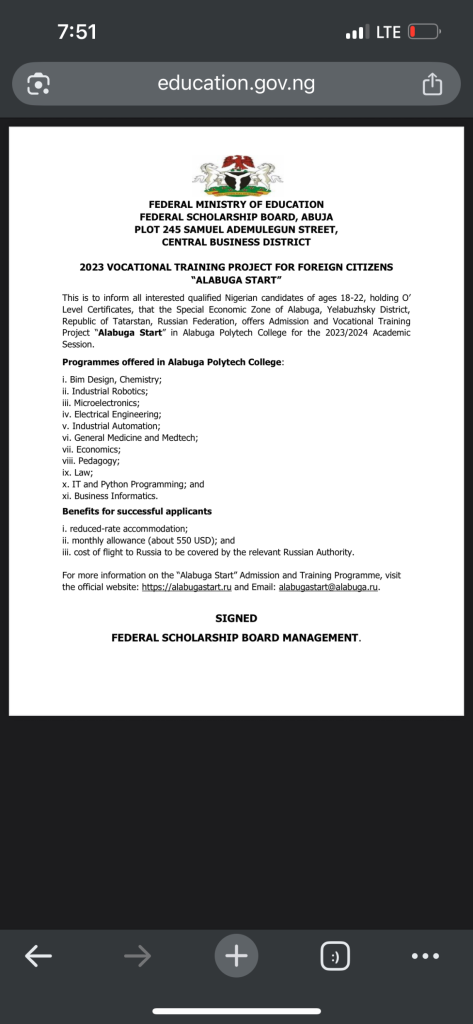
A screenshot of the statement on the Ministry of Education website
FSB official Chris Eje admits, in line with the comment made by Ms Asta, that fraudulent institutions “sometimes hack” the ministry’s website “to upload fake reports and press releases advertising fake educational opportunities.” “If anything, this is a deceptive tactic used to give the programme credibility,” he said. “A scammer published this.” When asked why the false statements have not been taken down, he says, “I don’t know.”
Besides using social media channels, Alabuga Start has also contracted employment and travel agencies in Nigeria to recruit young women. Some of these have substantial social media followings and use persuasive marketing posts to attract applicants. Adeleke Oluwatobi, director of one of these, called “Mercy of Success Konsultant”, tells me that “There is a network of recruiters. We (Mercy) have signed a memorandum of understanding with them (Alabuga)”.
Initially reluctant to share the agreement his agency has with Alabuga, saying “It’s a confidential document. I have to be careful,” he eventually shares a video recording of a 3-page document, titled “Memorandum of Understanding between Special Economic Zone of an Industrial and Production Type “Alabuga” and MOS Konsultant.” The document is written in both English and Russian and states that the agreement has been drafted to develop and strengthen cooperation between “parties in the field of employment in Nigeria under the programme Alabuga Start.” It adds that the recruiter is mandated to “disseminate information about the (Alabuga) programme to potential participants” and to “provide support in establishing contacts with other structures or organisations that may be interested in helping to disseminate information about (the) programme.”
Another part of the document indicates that the recruiter is obliged to assist with the arrival of applicants to the Alabuga Special Economic Zone in Russia from Nigeria, and yet another that the agency is expected to “send participants of the programme to medical centers approved by the Embassy of the Russian Federation to undergo medical examination and obtain confirmation of the absence of the following medical conditions: HIV/AIDS, syphilis, tuberculosis, Hepatitis A, B, C. D, E, pregnancy and an X-ray.”
Topklass Erasco Travel & Tours agency also recruits for Alabuga in Nigeria. Branding herself as the “face of Alabuga” in Nigeria, Topklass director Cynthia Orah frequently posts promotional content about the programme on her official TikTok account, which has over 29,000 followers. When I contact her with concerns about the nature of the Alabuga programme and its recruitment process, she says that this is all “false information.”
Both Topklass Erasco and Mercy are registered businesses under the Nigerian Corporate Affairs Commission (CAC). Both Mercy’s Oluwatobi and Topklass’s Cynthia Orah insist that they are also recognised by the Nigerian government as recruiters for foreign companies. However, a license by the Ministry of Labour is required for such a purpose, and the Ministry of Labour, when asked about Topklass and Mercy, states that these are “not on the list of licensed private employment agencies.” When I ask both agencies’ directors for a response to this finding, Ms Orah only says she feels “insulted” and will no longer be interacting with me. Mercy’s Mr Oluwatobi does not respond at all.
Since the Telegram channel discussions reflect that the Russian Embassy in Nigeria is the final step in the Alabuga registration process, I try to engage with the Ambassador, Andrey Podelyshev, at a press briefing held by him, but all my questions are met with denial. He says he can’t tell me how many visas his embassy has granted to Nigerian Alabuga applicants and that he can also not comment on the welfare of participants in the programme. “The embassy does not have any relationship with Alabuga”, he states and adds that he “knows little” about the programme. He insists, however, that foreign participants are not recruited to assemble military drones as “Russian legislation prohibits this. For anyone to work in the plant, they must obtain clearance from the security agency.”
Hopeful that I may receive cooperation or insights from diplomat Abdullah Shehu at the Nigerian Embassy in Russia -he visited the site and posed with participants already in 2023, so he must have access- I am disappointed again. No reply comes to my query regarding Nigerian participants’ welfare in the Alabuga Special Economic Zone, or regarding the possibility of facilitating a meeting with them. Likewise, the Nigerian Ministry of Foreign Affairs does not respond to the question whether it is aware of any programme that invites young Nigerian women to Russia.
Meanwhile, the Alabuga Telegram channel keeps growing, with many applicants still joining the queue; the complaints about delays likewise seem never-ending. At some point, my compatriot Nneka Amadi, -the one who told me that Alabuga was her “escape route” out of Nigeria-, seems to have had enough. Lashing out on the group early in August, she writes that “God knows that my deadline for Alabuga is August 31. If I don’t have my visa by then, I’ll scratch (forget) everything about them and won’t encourage anyone else to apply. Imagine spending money to get a visa and then having no flight ticket (…) Will that money be refunded to me?”
Two weeks later, Ms Amadi has given in, reconciled to the fact that she has yet to invest more money for her chance to travel. After writing: “Life has defeated you 4 – 0 by making you Nigerian”, she resignedly tells me that the recruiters did not book her flight (yet) and that she will now apply for another visa. “And that will cost me more money.”
*Names in asterisks have been changed for privacy and security reasons.